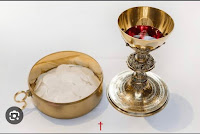Deut 8:2-3, 14-16; I Cor 10:16-17; Jn 6:51-52
Two days after the boat left on, they complained of hunger and thirst to the Captain who could offer them no solution as he was hopelessly lost.
The situation turned even worse when the fuel ran out leaving them stranded and completely helpless.
One week into the trip they were so weak from food deprivation, the first person died and was thrown into the sea.
They tried to sustain themselves on rain and seawater as they bobbed for days on the open waters, far off their original course. Famished and dehydrated, the survivors watched migrant after migrant die, each time dutifully waiting 15 to 20 minutes before throwing the body overboard.
By the 13th day only six people remained. It was almost certain that nobody would complete their journey. The dying men persuaded those who were still alive, to eat their body to survive - a great act of concern.
In every nook and corner of the world we see a great symbol that announces the offer made by a man to sacrifice himself for giving life to the whole of humanity. The cross reminds us about the great sacrifice of Jesus. Looking at the clouds that pass by embracing the cross, a poet sang – those clouds must be angels that come down to venerate the cross that silently proclaims the great sacrifice that had taken place two thousand years ago.
At the last supper Jesus established the Sacrament of Eucharist and symbolically shared His body and Blood with His disciples. He also commanded them to do it till the end of the world, in His memory. Food gives energy for sustenance. The Spiritual food Jesus offered, gives energy for spiritual sustenance.
The concept of God feeding His children is found throughout the Sacred Writings.
When the Israelites, on their journey to the Promised Land, were hungry God fed them with Manna. God sent a raven to feed Prophet Elijah. God sent Prophet Elijah to feed a woman in Zarephath. When Jesus saw the hungry people, he fed them with bread and fish, and finally Jesus went to the extreme of offering Himself for the spiritual sustenance of His People.
We believe in the real presence of Jesus in the Holy Eucharist. And today, when we celebrate the Feast of Body and Blood of Christ, we proclaim that conviction aloud.
At the Last Supper, after taking the bread and breaking it, Jesus said, "Take, eat, this is My Body." [Mt. 26:26] Jesus clearly said that the consecrated Bread becomes His physical Body, therefore, He dwells with us and within us in this world. Afterwards, Jesus said, "Drink from it, all of you, for this is my blood of the covenant, which is poured out for many for the forgiveness of sins." [Mt. 26:27-8].
When Jesus spoke of His Blood, He was telling us that through His death, the spilling of His Sacred Blood, a New Covenant was beginning. The sins previously committed would be forgiven so we would be made righteous in the eyes of God. Through our new creation, the new spirit within us that cannot die because it is of the godly seed, we received a second chance.
In His teachings, Jesus added, "I am the living bread that came down from Heaven. Whoever eats of this bread will live forever..." [Jn. 6:51] Here, Jesus is telling us that to maintain the on-going righteousness that we have received in the Sacrament of Baptism, we need to continually receive the Sacrament of the Holy Eucharist, the Living Bread of eternal life, the Body of Christ who is physically manifested in the Holy Eucharist.
Jesus makes the promise so astonishing that it takes all our faith to accept Him
“He who eats my flesh and drinks my blood
lives in me and I live in Him (Jn 6:56) and
“As I myself draw life from my Father,
so whoever eats me will draw life from life.”
This imposes a serious obligation on us Christians – to receive the Holy Eucharist only if we are determined to live in peace with one another. If there is disunity, if our hearts are filled with malice towards others, if we indulge in injustice, if we our thoughts are impure, we have no right to partake in the breaking of the Bread. The sacrament of the Holy Eucharist is the living bread of eternal life. Therefore, it is meant for those who are pure of heart. Justin the martyr taught “It is allowed to no one else to participate in that food which we call Eucharist except the one who is living according to the way Christ handed on to us.” St Augustine preached, “Before you receive Jesus Christ, you should remove from your heart all worldly attachments which you know to be displeasing to Him.
The most pleasing gift that we can give to Jesus is a blameless heart. St. Therese of Lisieux wrote, “Our Lord does not come down from Heaven every day to lie in a golden ciborium. He comes to find another heaven which is infinitely dearer to Him - the heaven of our souls”.
Dear brothers and sisters, let us discard everything that displeases Jesus, and make our hearts a dearer heaven to Him.
Satish
